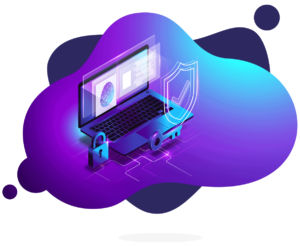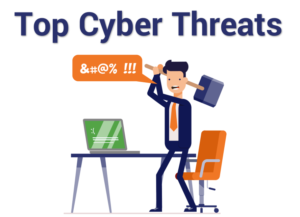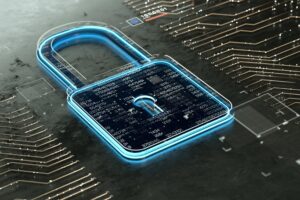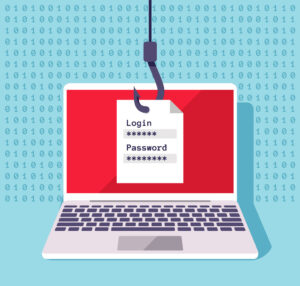
Don’t be a Victim. Look it up! Cyber Security
Our usage of internet has grown tremendously. And if you aren’t careful, fraudsters will have plenty of opportunity to deprive you of your money or other confidential material. What exactly is Cyber Security, and why is it so crucial?
 Cyber Security means protecting data, network, programs and other information from unauthorized or unintended access. In this age where the use of computer has become commonplace, cyber security is major concern. The threat from people with malicious intent can be caused due to negligence and vulnerabilities. Different forms of attacks like viruses, malware, spyware, phishing, ransom ware, fraud etc.
Cyber Security means protecting data, network, programs and other information from unauthorized or unintended access. In this age where the use of computer has become commonplace, cyber security is major concern. The threat from people with malicious intent can be caused due to negligence and vulnerabilities. Different forms of attacks like viruses, malware, spyware, phishing, ransom ware, fraud etc.
infected Web Pages and various Websites allow hackers to gain access to other computer systems. Opening emails attachments that carry the virus, clicking malicious links or websites or unintentionally downloading a dangerous program or installing infected Apps in mobile.
Attackers can be terrorists, crackers or recreational hackers. You are totally wrong if you believe that you are protected and that we do not need Cyber security because only big businesses succumb to hackers or software attacks. If a frequent internet user isn’t careful, he or she can quickly become a victim. Because it only takes a few minutes to hack an internet-connected device, cyber security is critical.
A laptop, desktop, smart television, Smartphone, or smart watch can all be used as this device. When connected to the internet, every smart device requires a smart user!
So, let’s go over the many online risks and the significance of Cyber Security in the following points:
Cyber Security Threats in Many Formats
 Hackers have devised a variety of methods for breaking into your system. It is important to be aware of these online threats as well as the importance of cyber security. Nowadays, the following are some of the known cyber security threats:
Hackers have devised a variety of methods for breaking into your system. It is important to be aware of these online threats as well as the importance of cyber security. Nowadays, the following are some of the known cyber security threats:
Phishing
This is the most popular method of attacking the general population on the internet. Fake text messages and emails are sent in this way to gain access to a user’s confidential information.
Malware
Because even emails from suspicious sites are not secure, Cyber Security awareness is becoming incredibly valuable. Ransom, worms, malware, and viruses can be downloaded or sent by email from some vulnerable websites, putting your security at risk.
Man-in-the-Middle Attack
In order to steal data, the attacker in this type of attack enlists the help of a two-party communication system. The attacker may even be able to alter the communication in this case.
Attack on Passwords
In this type of attack, the hacker uses the hit-or-miss strategy to crack a password. Poorly chosen passwords are simple to crack.
Attack on SQL Injection
When you see the technological advancements used in this type of hacking, you’ll realize why cyber security is so vital. The hacker will insert malicious code onto a SQL-based server in this case. This is usually accomplished through the use of an insecure website search box. If this is effective, the hacker will have access to the confidential information of the target.
How Does Good Cyber Security Look Like?
 There are some important points of the Cyber security that you should follow both at work and your home:
There are some important points of the Cyber security that you should follow both at work and your home:
- Secure your Wi-Fi
- Wise GPS and Bluetooth Usage
- Select Strong Passwords
- Use Antivirus in your System
- Avoid Suspicious Texts and Mails
- Use Encryption and Firewalls
- Keep your Mobile devices under your sight
Cyber Security Tips for Individuals
Keep Your Software Up to Date
Ransomware assaults were a major attack vector for both enterprises and consumers in 2017, as evidenced by the statistics above. Patching outdated software, both operating systems and applications, is one of the most critical cyber security strategies for preventing ransomware. This aids in the removal of significant vulnerabilities that hackers exploit to gain access to your devices. Here are some pointers to help you get started:
- Configure your device to receive automatic system upgrades.
- Make sure your desktop web browser downloads and install security updates automatically.
- Keep your web browser’s plugins, such as Flash and Java, up to date.
Use an anti-virus programs and a firewall
To combat malicious attacks, anti-virus (AV) protection software has been the most widely used approach. Malware and other harmful viruses are prevented from entering your device and corrupting your data by antivirus software. Use only one anti-virus tool on your device, and be sure it’s from a reputable vendor.
When it comes to protecting your data from hostile attacks, using a firewall is essential. A firewall protects your device by filtering out hackers, malware, and other malicious activity that occurs over the Internet and deciding what traffic is allowed to enter. Windows Firewall and Mac Firewall are the firewalls that come with Windows and Mac OS X, respectively. To protect your network from threats, your router should include a firewall.
Create strong passwords and use a password manager
 Strong passwords are essential for internet security, as you’ve probably heard. Passwords are crucial in keeping hackers away of your information! According to the new password policy framework published by the National Institute of Standards and Technology (NIST) in 2017, you should think about:
Strong passwords are essential for internet security, as you’ve probably heard. Passwords are crucial in keeping hackers away of your information! According to the new password policy framework published by the National Institute of Standards and Technology (NIST) in 2017, you should think about:
- Getting rid of the wacky, convoluted mix of upper case letters, symbols, and numbers. Instead, choose something more user-friendly that is at least eight characters long and no longer than 64 characters.
- Do not re-use the same password.
- At least one lowercase letter, one uppercase letter, one number, and four symbols are required, but not the characters & percent # @ .
- Choose a password that is simple to remember, and never leave a password hint in plain sight.
Make regular backups of your data
Regularly backing up your data is an often-overlooked aspect of personal online security. The 3-2-1 backup guideline is followed by the top IT and security executives. In essence, you’ll retain three copies of your data on two separate types of media (local and external hard drives), as well as one duplicate off-site (cloud storage).
If you’ve been infected with ransomware or malware, the only method to get your data back is to wipe your systems and restore from a recent backup.
Avoid Using Public Wi-Fi
 Use a Virtual Private Network (VPN) when accessing public Wi-Fi (VPN). The traffic between your device and the VPN server is encrypted when you use VPN software. This indicates it’s a lot more. It will be more difficult for a cybercriminal to gain access to your device’s data. If you don’t have a VPN, use your wireless network when security is a concern.
Use a Virtual Private Network (VPN) when accessing public Wi-Fi (VPN). The traffic between your device and the VPN server is encrypted when you use VPN software. This indicates it’s a lot more. It will be more difficult for a cybercriminal to gain access to your device’s data. If you don’t have a VPN, use your wireless network when security is a concern.
We hope that this blog has given you a better understanding of why cyber security awareness is so vital. We hope this helps you feel more secure and prepared the next time you go online!
Conclusion
We hope that this blog has given you a better understanding of why cyber security awareness is so vital. We hope this helps you feel more secure and prepared the next time you go online!










